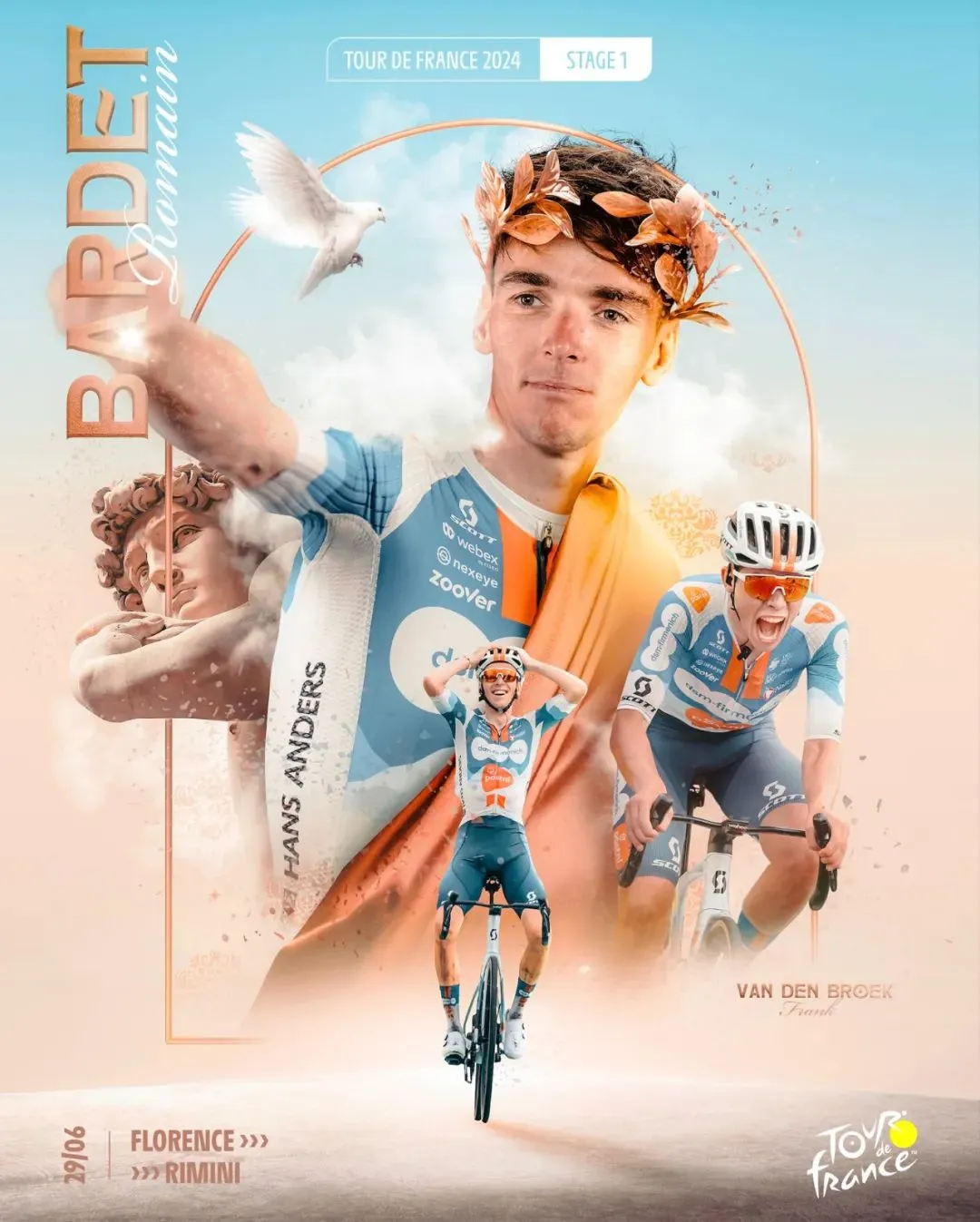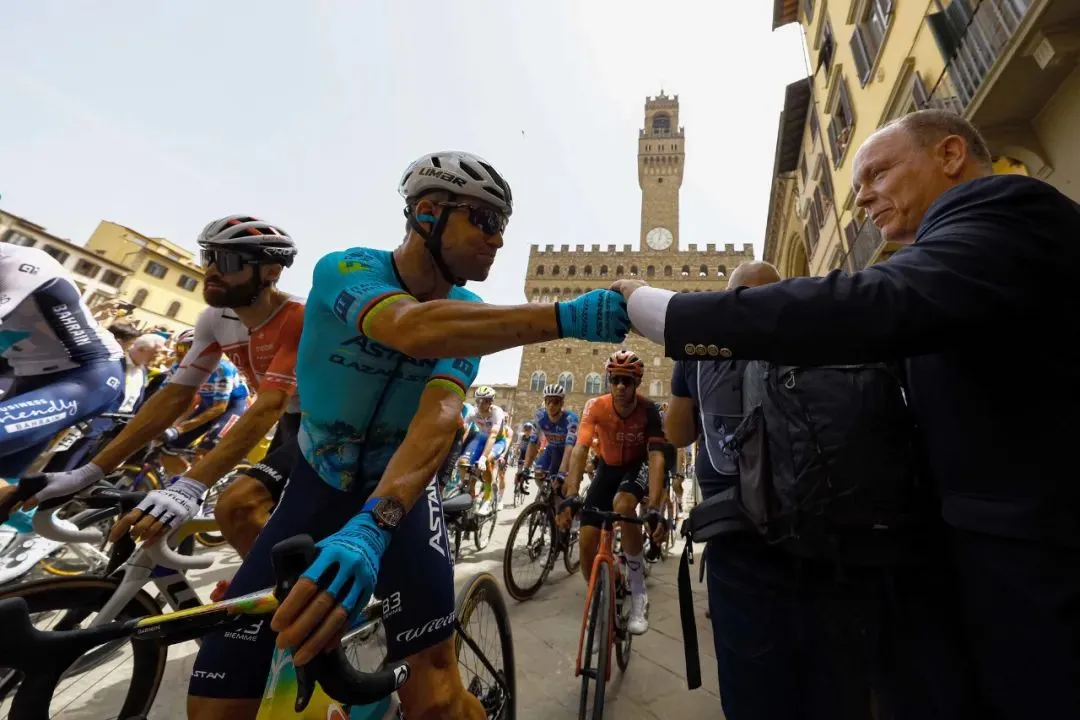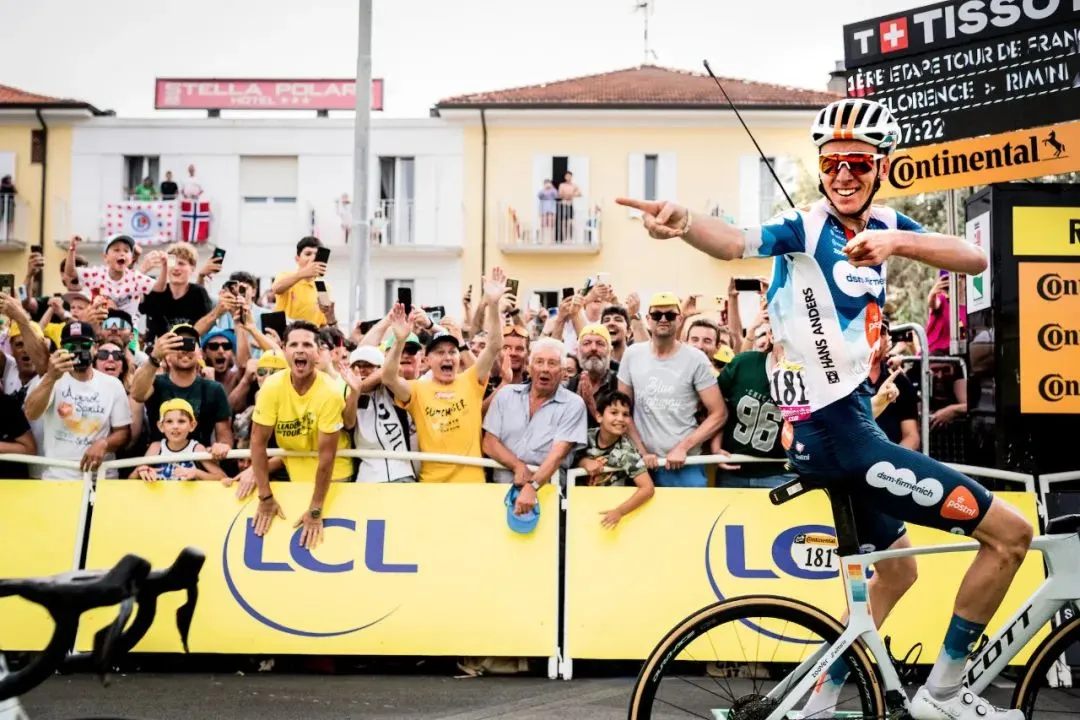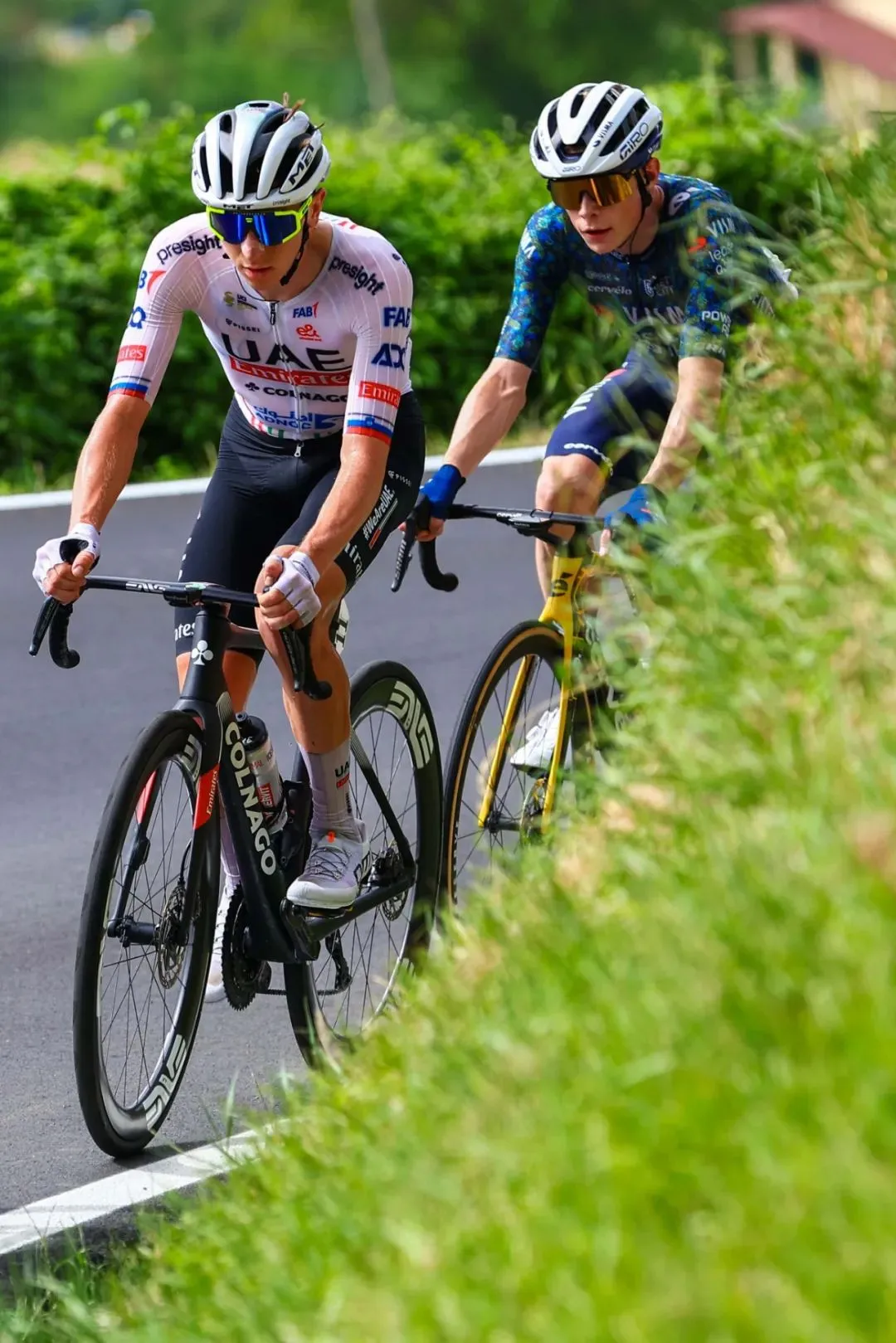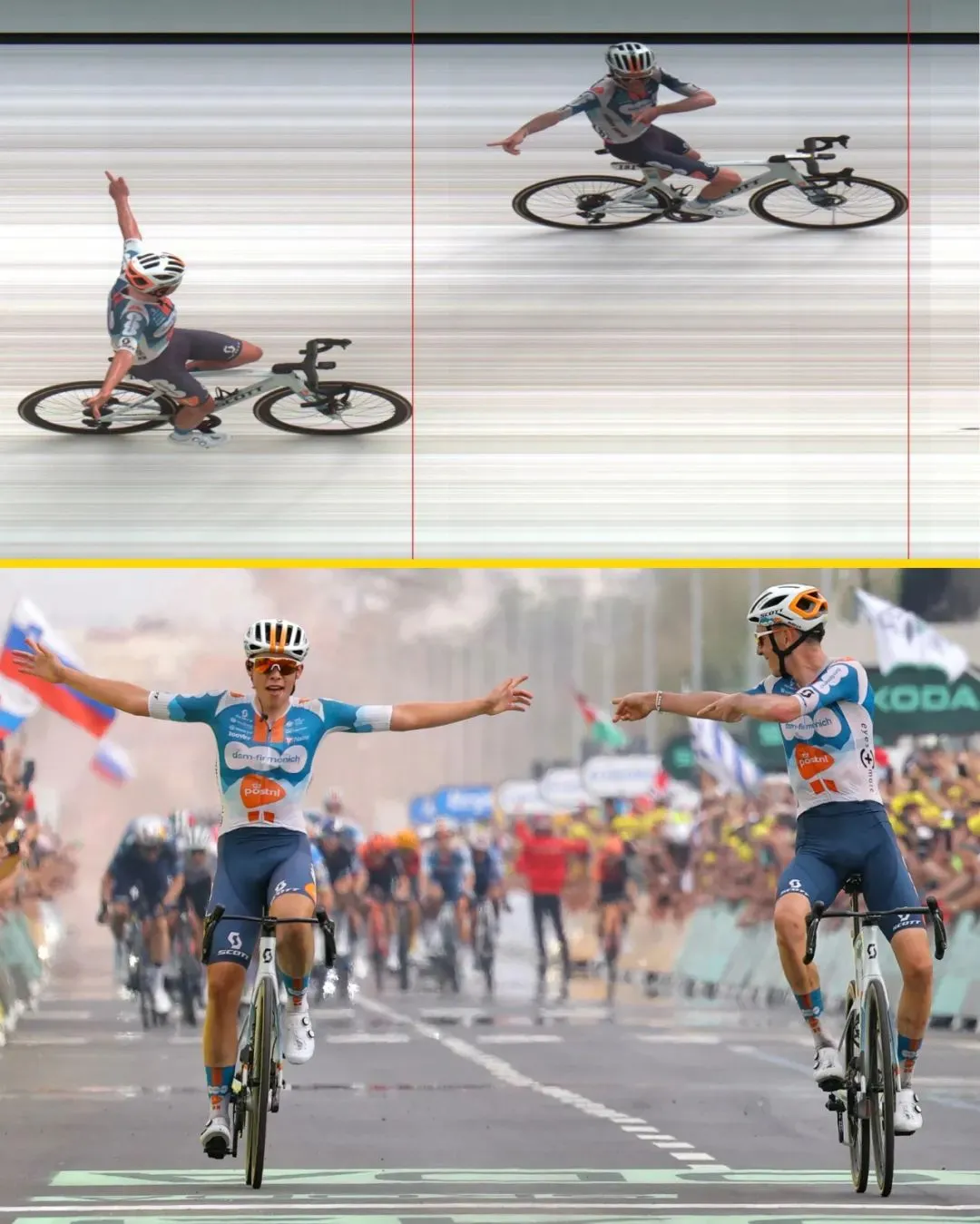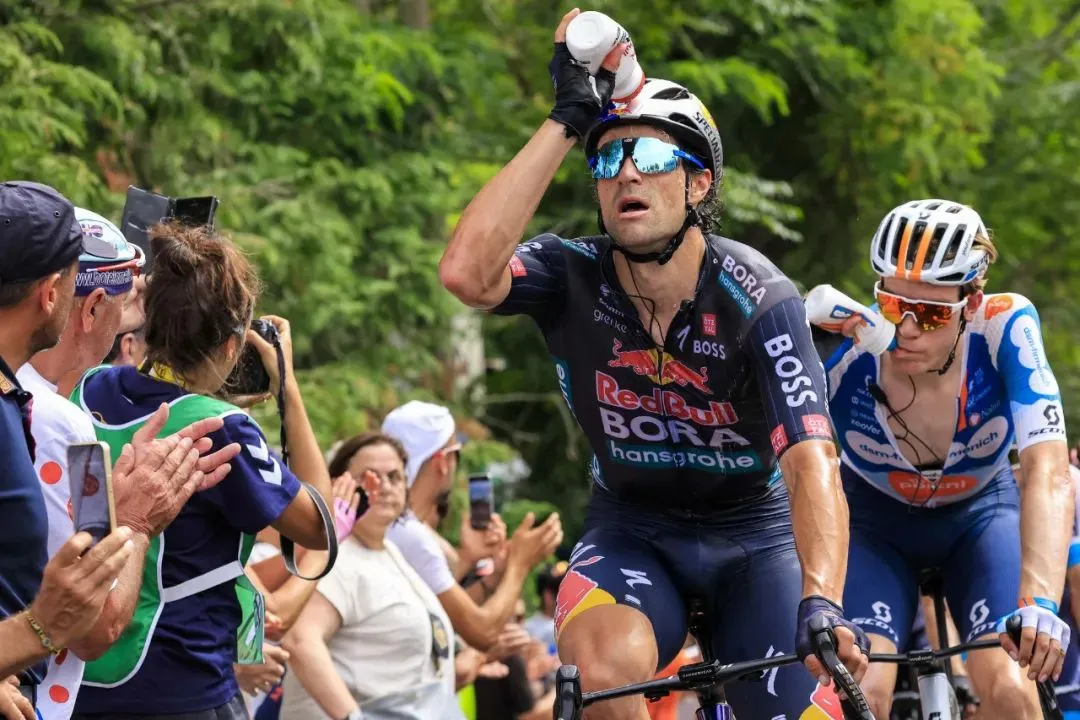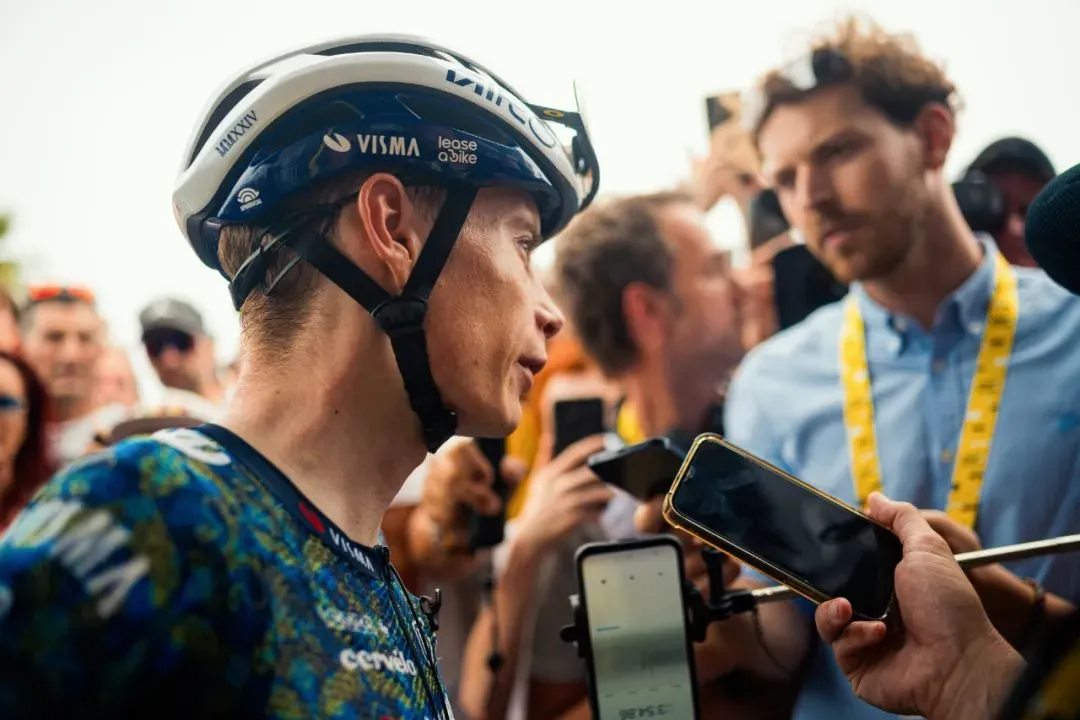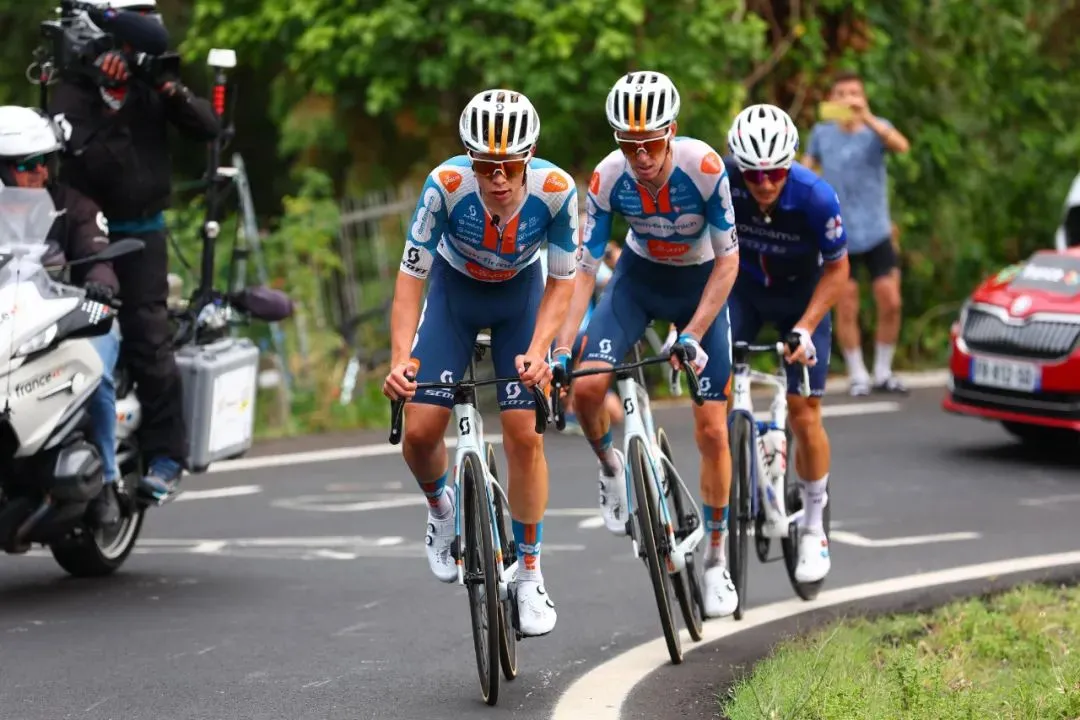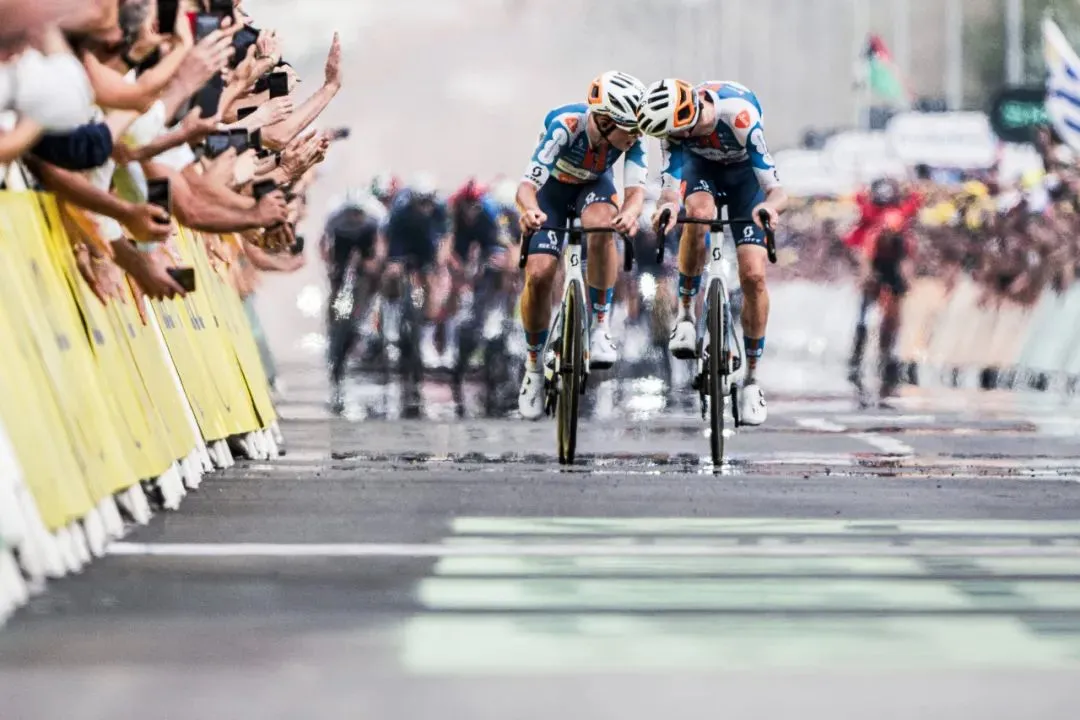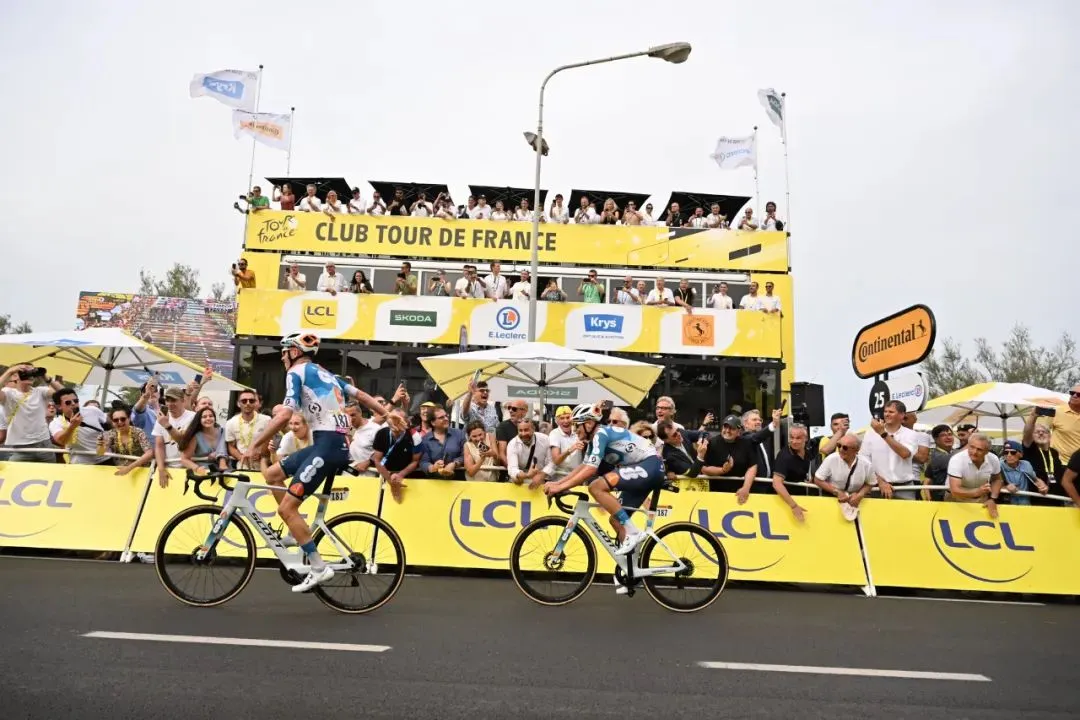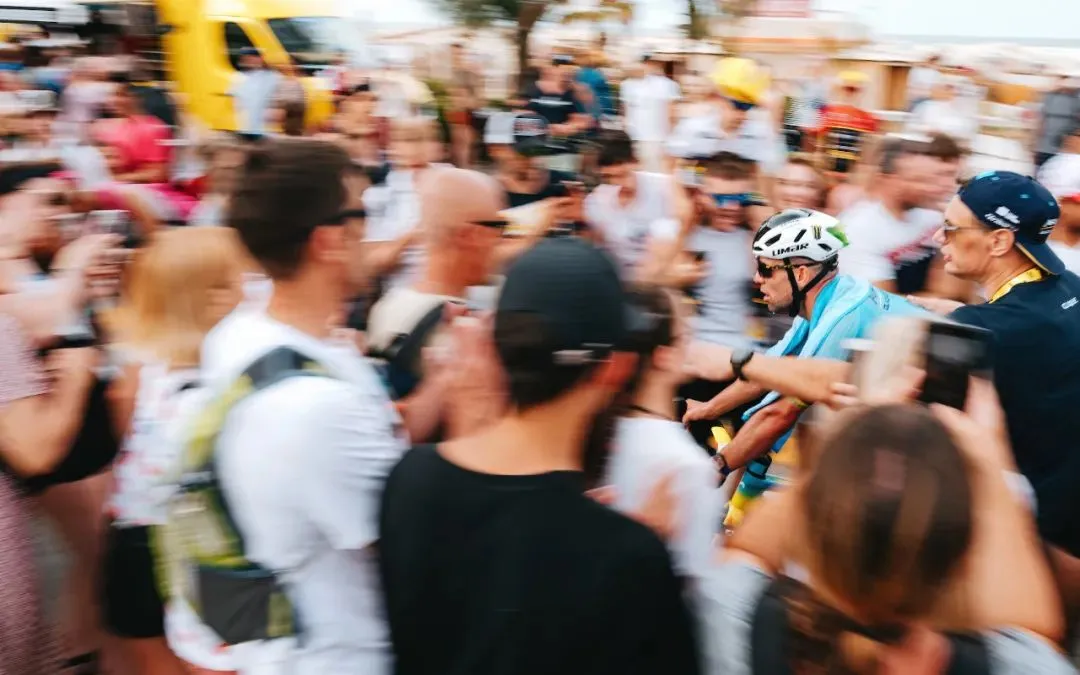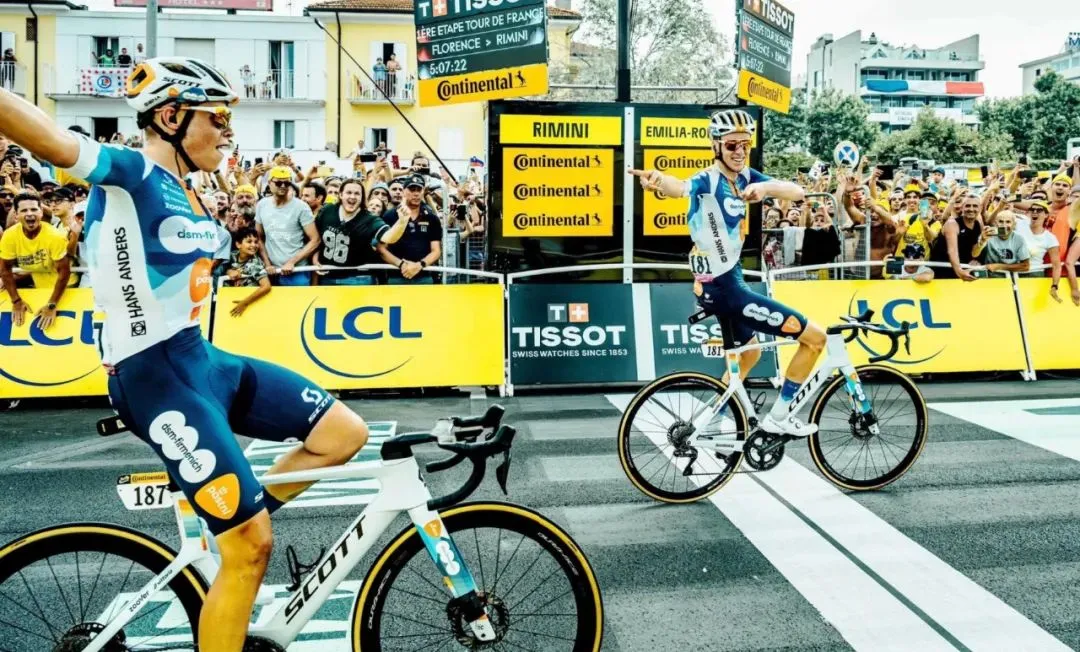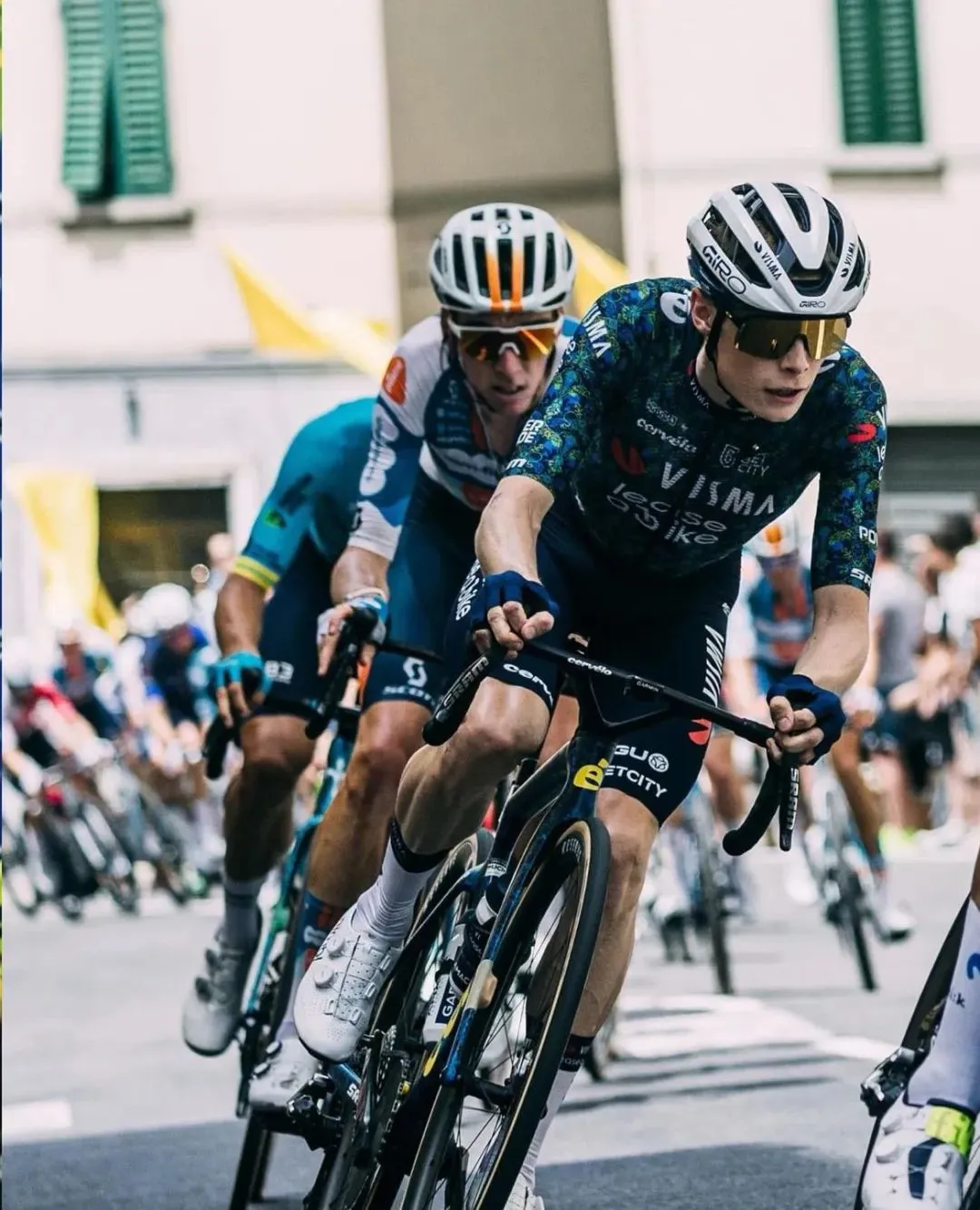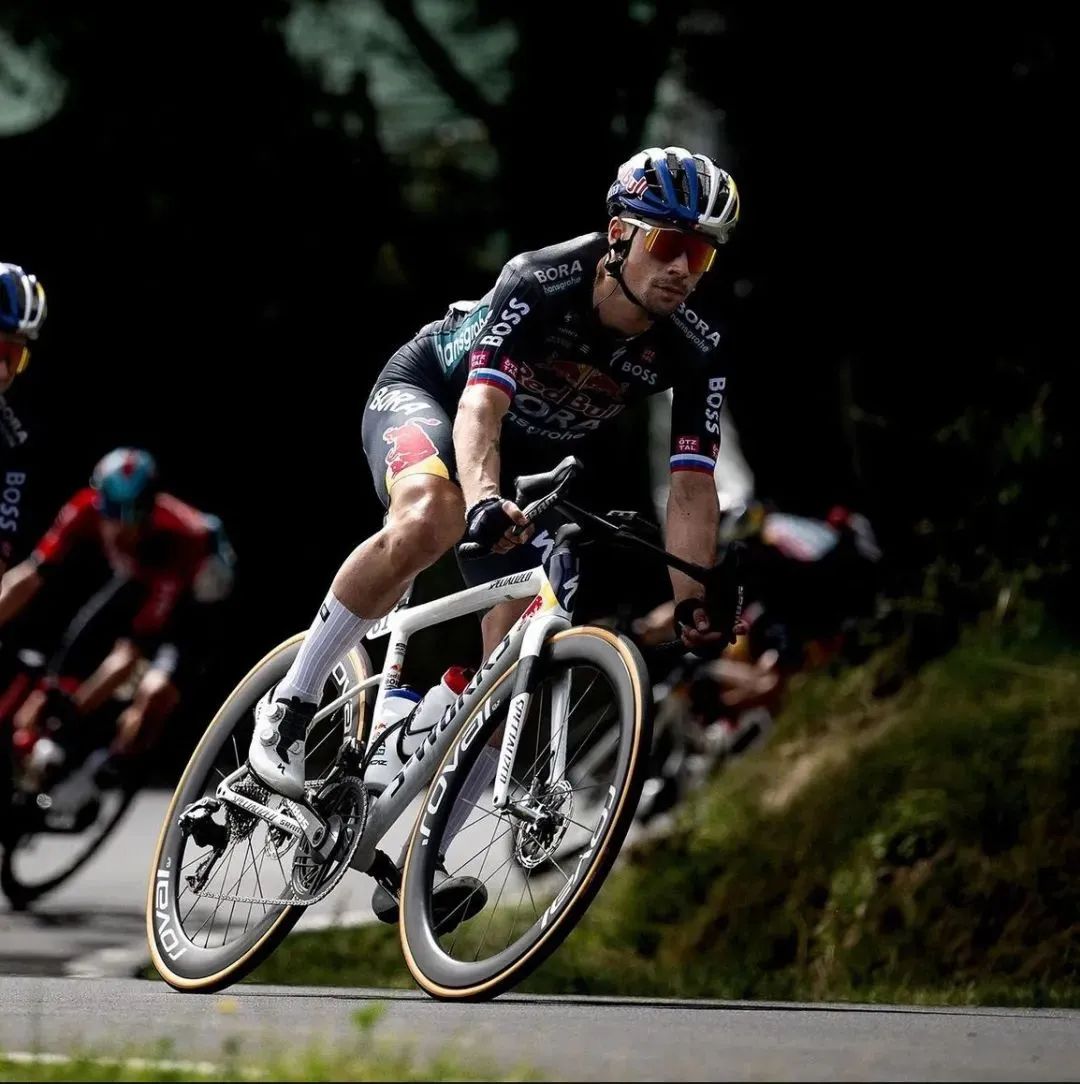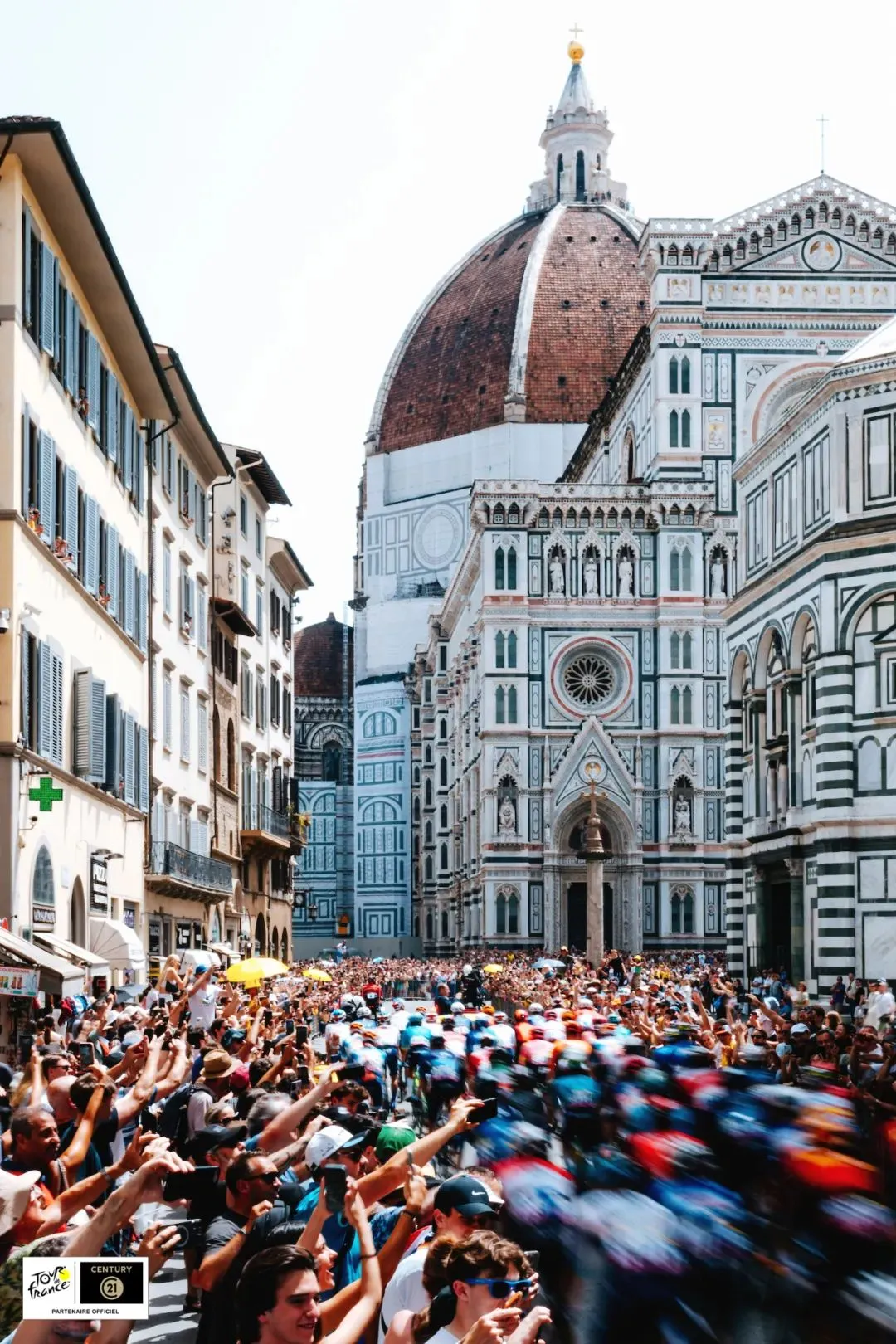The champion of the first stage of the 2024 Tour de France was born
Roman Bardet and his teammate Frank Vandenbroucke worked together with one heart to successfully win the first stage of the Tour de France, and the whole process was full of thrills and excitement. In terms of the overall standings, the performance of the riders was relatively stable, and they all completed the race safely. Cavendish had a heatstroke shortly after the start of the race, but fortunately, he managed to complete the race with difficulty.
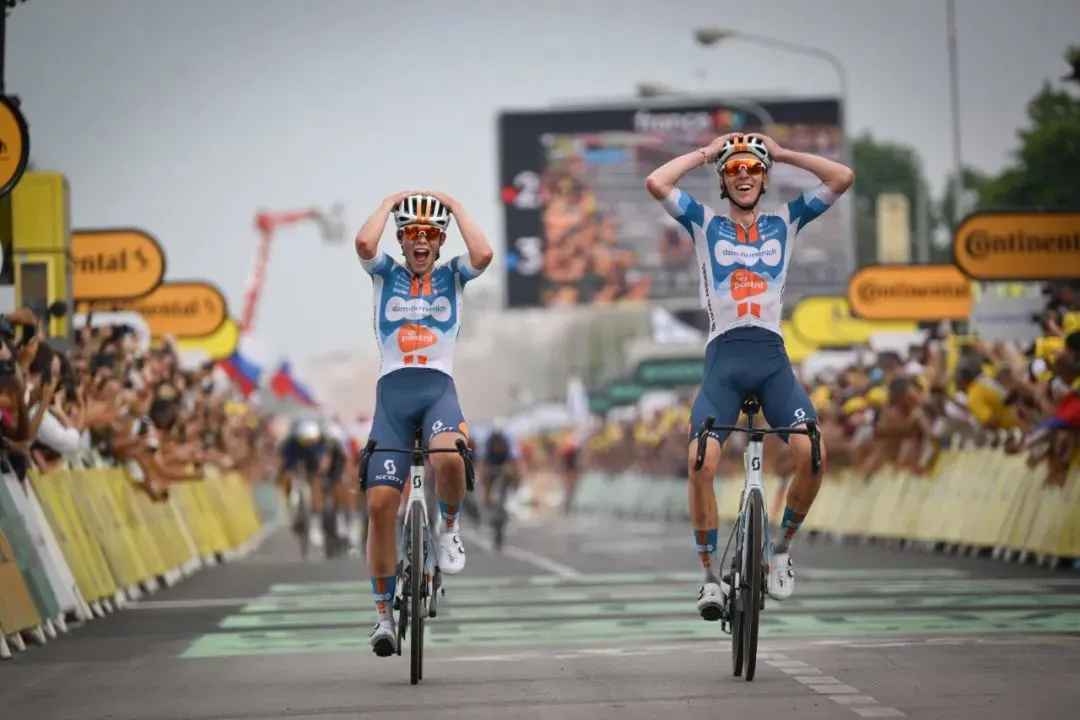
Roman Bardet and Frank Vandenbroucke were ecstatic in their celebration of winning the stage championship, their faces brimming with uncontrollable joy, cheering and hugging with excitement, fully expressing their inner excitement and pride.
Who could have imagined that the first stage of the Tour de France would be so thrilling and exciting! Roman Bardet and his teammate’s breakaway had a mere one-minute advantage when they were 10 kilometers from the finish line. This situation almost certainly foretold that they would be caught by the peloton.
The two-man breakaway showed no intention of giving up; they worked closely together in the last few kilometers, cooperating with all their might. When they entered the final 1 kilometer, the gap was down to just 10 seconds. You never know the outcome until the very last moment, and ultimately, this duo won with a slim margin, a thrilling victory.
This is the Tour de France, a race where such exciting chases cannot be found in other competitions.
After his fourth stage victory in the Tour de France, Bardet said: “This is crazy. I had to support myself, I had to hope for the best. I wasn’t particularly familiar with this course, but Frank was very strong up front, and I felt like I had nothing to lose. It’s because Frank is so strong that we could collaborate and give it our all - he truly deserves this victory.”
Bardet also became the first Frenchman to wear the yellow jersey since Julian Alaphilippe in 2021. “This has definitely been a major goal I set for my career,” he added. “I was so close before, within reach, but I never managed to do it. Today - I wasn’t sure if it would happen, but I had a great teammate with me. When I look back on this victory, I will remember how special it was.”
Stage Introduction
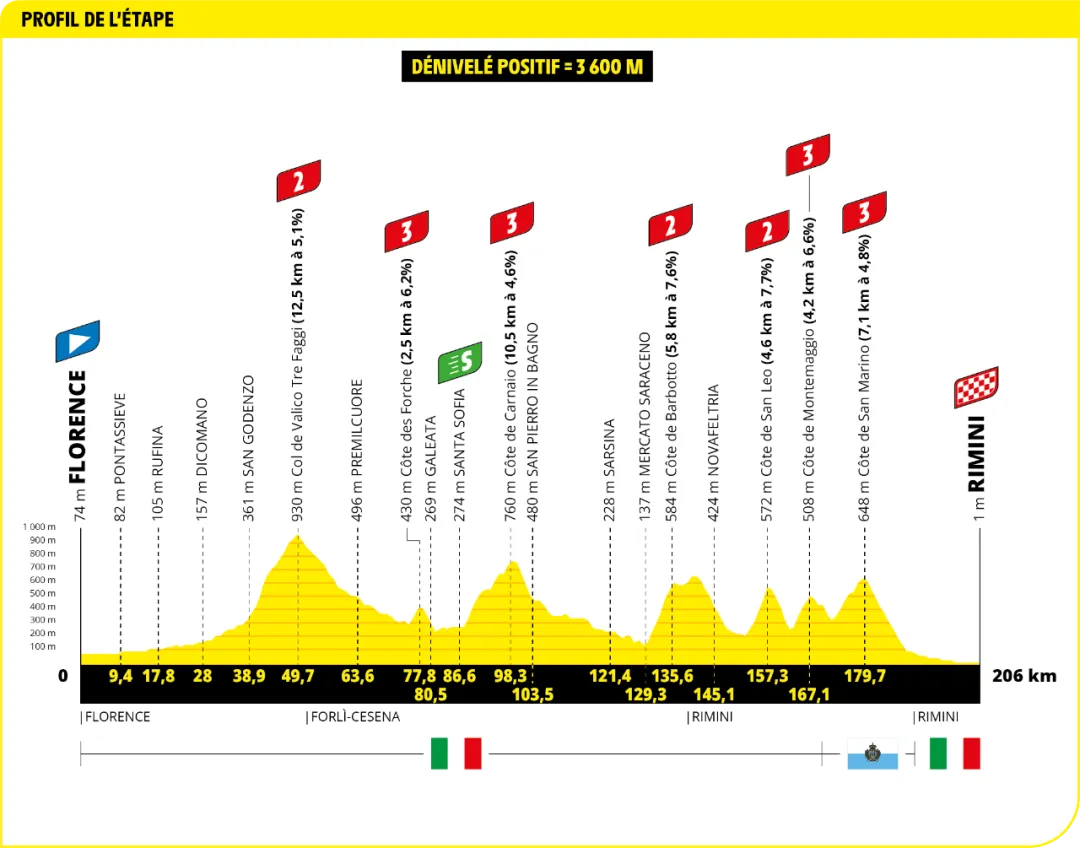
Competition process
The grand departure of the 111th Tour de France took place for the first time in Italy, with teams rolling out slowly on the streets of Florence. After a comprehensive 16.2-kilometer section that passed through palaces and churches, the riders went through the city gates and entered the Tuscan countryside, thus welcoming the most difficult opening stage in the history of the Tour de France.
The route starts from the banks of the Arno River, heading east towards Rimini on the Adriatic coast. Before reaching the faster 25-kilometer section at the end, there are seven categorized climbing sections to go through.
Before the start of the race, an injured rider appeared, Jan Hirt from the Quick-Step team, who had a collision with a spectator after signing in, resulting in three broken teeth and a bloody nose. Despite this, he still participated in the race, obviously in great pain.
Facing a climbing height of up to 3600 meters on the first day of riding, the teams still quickly started the competition. Due to the tense emotions before the eve of the Tour de France, most teams were eager to break away as soon as possible. However, the UAE Team and Red Bull - Bora - Hansgrohe controlled the front of the main group and were not willing to let a large group rush to the front.
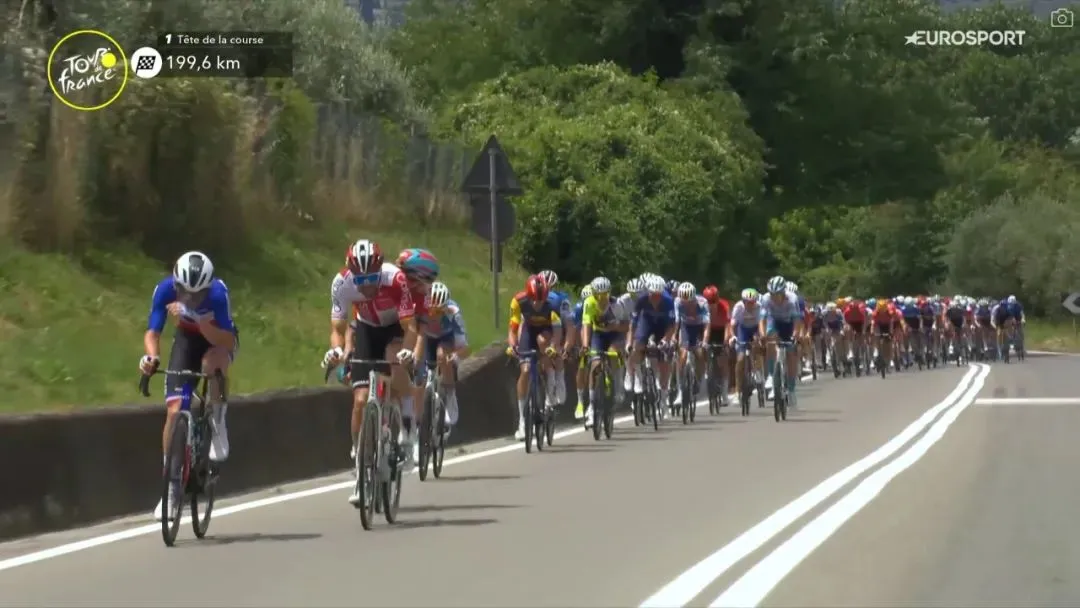
The main group was not particularly keen on letting a large breakaway group get away; they tried to control the pace and speed to limit the formation and development of the breakaway group, in order to maintain the stability and controllability of the race situation.
Wave after wave of attacks were quickly swallowed up by the main group. It wasn’t until a team of seven, taking advantage of a brief pause by the main group, managed to gain an advantage. Riders slowed down one after another under the scorching Tuscan sun, replenishing food and drinks. At this time, a powerful team composed of Matej Mohoric (Bahrain Victorious), Ion Izagirre (Cofidis), Valentin Madouas (FDJ), Clément Champoussin (FDJ), Matteo Velo and Sandy Dijkstra (TotalEnergies), and Frank Vandenbroucke (Team DSM) stood out. They had already opened up a gap of one minute with the peloton after just about 20 kilometers of racing.
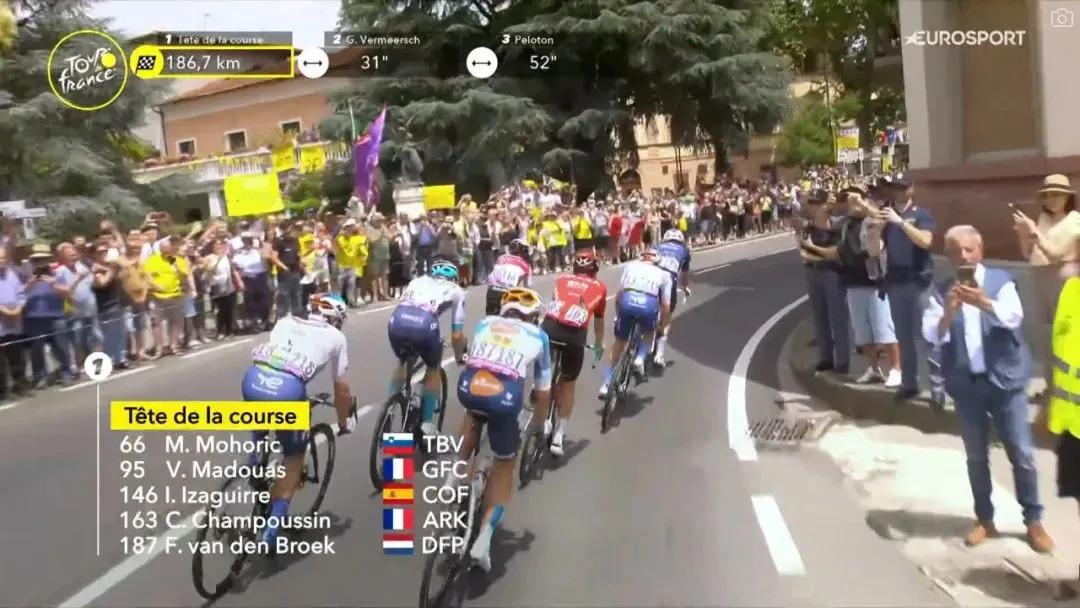
A strong breakaway group, comprised of several powerful riders, thus emerged.
Clearly frustrated at having missed the break, Team Uno-X attempted counterattacks with several different riders, eventually managing to get Jonas Abrahamsson (Uno-X Pro Cycling Team) and Ryan Gibbons (Lidl-Trek Team) to join their effort.
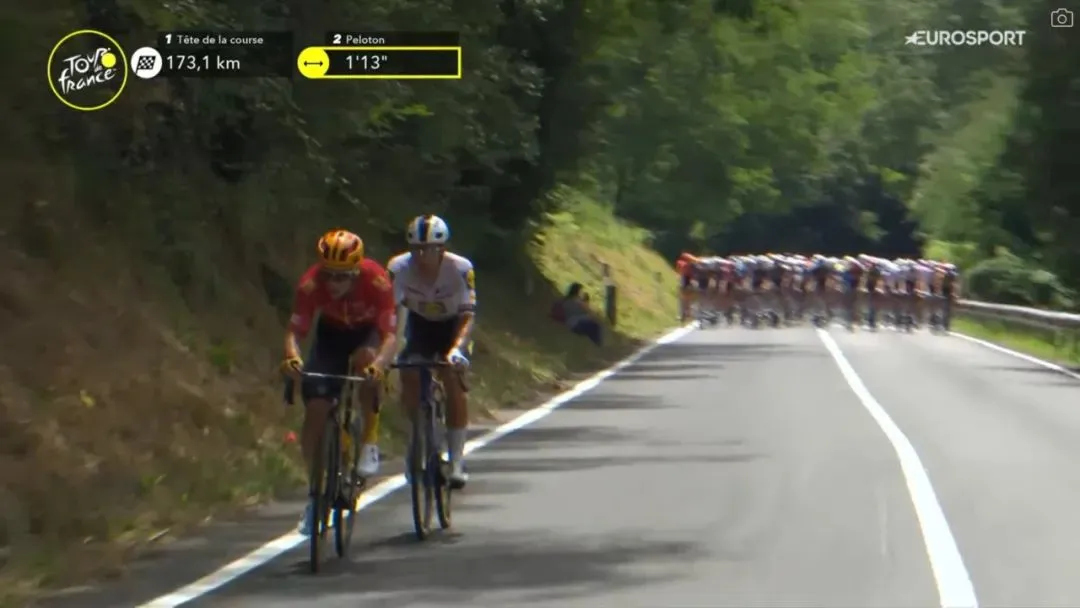
As the peloton tackled the Tour de France’s first climb of the day, the 12.5-kilometer ascent of the Col du Valico Tre Faggi, the seven leaders had established a 45-second advantage over their two chasers and a two-and-a-half-minute lead on the main group. With steeper climbs looming ahead and given the relentlessly bumpy terrain that characterized the day, the peloton was content to let the gap widen further. Gibbons and Abrahamsson ascended the Category 2 climb at a brisker pace, and their efforts paid off as they managed to bridge the gap to the breakaway group.
Many riders struggled in the sweltering heat, with Welsch falling back from the leading group. Mark Cavendish (from Astana) also predictably lost contact on the climbs, finding himself trailing behind the main bunch – an ominous start for the Manxman. As the gap widened, his teammates Sisse Bøe, Michele Gazzoli, Davide Ballerini, and Michael Mørkøv diligently attended to him, constantly dousing him with water during the ascents to help keep his temperature down.
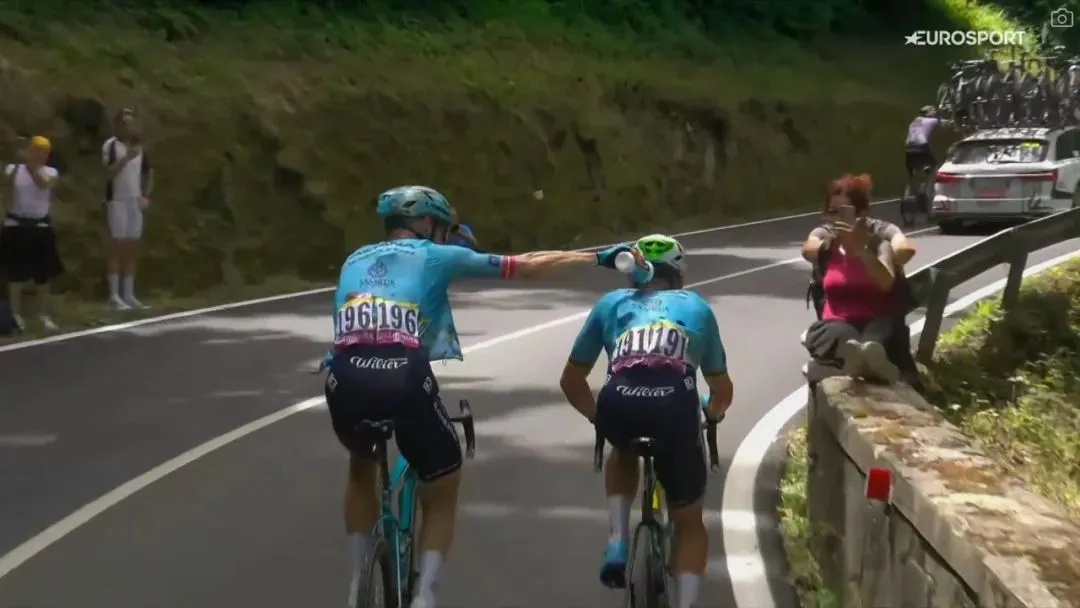
Cavendish, accompanied by his teammates, battled on valiantly.
This group, lagging eight minutes behind the leaders and three minutes behind the main peloton, still faced six more climbs to conquer. Cavendish’s Tour de France ambitions – and his quest to surpass Eddie Merckx’s record of 34 stage victories – seemed perilously close to unraveling. He appeared to be suffering multiple times on the bike, notably struggling to stay with his teammates during descents.
At the other end of the race, Izagirre emerged victorious in a four-man sprint contest atop the Col de Val Louron-Azet, outpacing Madouas, Abrashkin, and Vandenbroeck to claim the first King of the Mountains (KOM) points of the Tour de France.
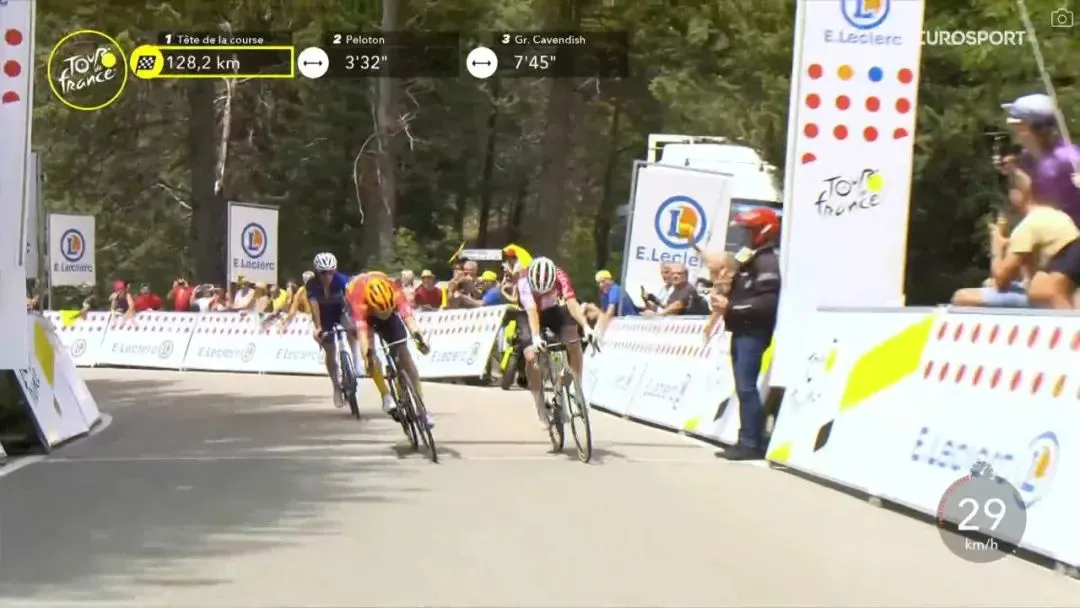
Cavendish replicated this feat atop the Côte de Fouch, once again outpacing Abrashkin and Madouas. Meanwhile, the peloton began to pick up the pace, trailing the eight leaders by three minutes and thirty seconds.
For the still-suffering Cavendish, this offered a slight glimmer of hope. Despite the shorter length of 2.5 kilometers, the gradient averaged a steep 6.7%, making it a tougher challenge. He managed to crest the summit, escorted by his teammates who provided as much moral support as physical assistance, but by then he was already more than five minutes adrift from the peloton, with slim prospects of making up time on the descent.
Dillardin edged out Abrashkin in the intermediate sprint at Saint-Sophie, grabbing the first points on offer. Three minutes later, Jasper Philipsen (Alpecin-Fenix) emerged victorious in the first real clash among the sprinters.
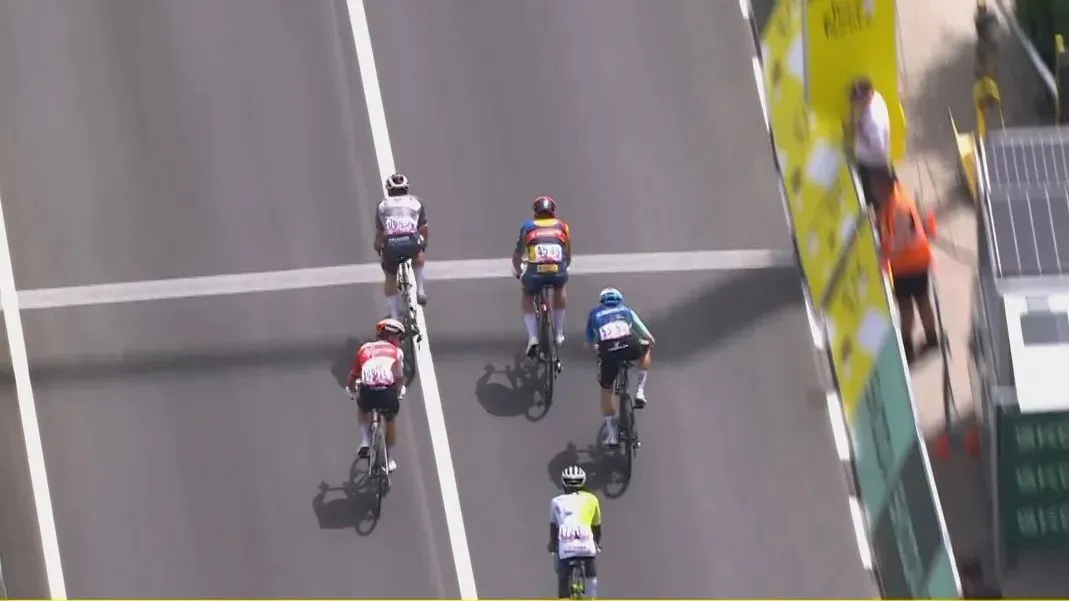
Philipsen claimed the intermediate sprint.
Lidl-Trek led out Mads Pedersen in the battle for green jersey points, but Philipsen surged past him at the line, with Sam Bennett (Decathlon-AG2R La Mondiale), Bryan Coquard (Cofidis), and Biniam Girmay (Wanty) also contesting the sprint finish.
Immediately following the sprint, the race resumed its upward trajectory with the climb of the Col de Caneo, a 10.5-kilometer ascent that began to whittle down the leading group. Dillardin and Champson both started to falter on this climb. It wasn’t just Cavendish; other sprinters were also in distress, as Fabio Jakobsen (Tiesj Benoot Team) and his teammates Bram Welten and Jonas Rickaert (Alpecin-Deceuninck) found themselves in the last remnants of the peloton.
Izagirre once again bested Abrashkin for the KOM points atop the Col de Caneo, launching his sprint from a considerable distance and securing the honors. Though there was no apparent interference from Izagirre, the Norwegian seemed displeased with the outcome.
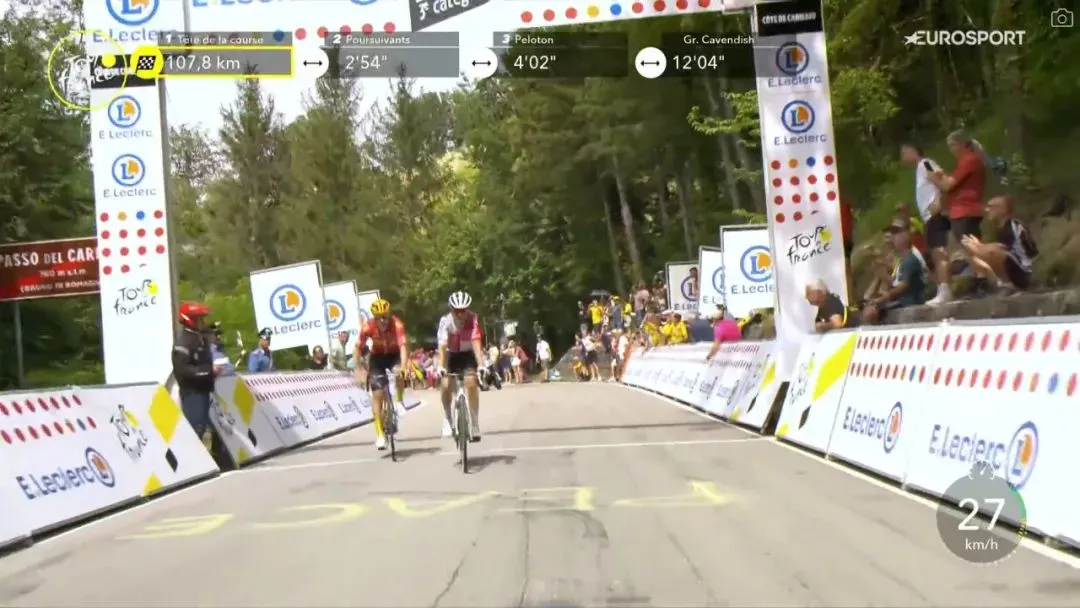
Team Jumbo-Visma’s woes continued as Wilco Kelderman, seen with his left elbow bandaged, rejoined the peloton after a crash. Astana’s disastrous opening day of the Tour took another hit when debutant Michele Gazzoli succumbed to the oppressive heat, becoming the race’s first retirement.
Down a man, the Astana-led chase group lagged 15 minutes behind the breakaway as the race entered its tougher and steeper second half, packed with four climbs within the next 80 kilometers. The sequence began with the technical approach to the Côte de Baborte, the steepest of the day at 7.6%.
Abrashkin finally claimed the prime KOM points at the summit of Baborte, launching a powerful sprint from nearly 500 meters out. Madouas, Vandenbroeck, and Mohorič followed behind, securing the remaining points a few bike lengths back. Izagirre, however, fell behind on this Category 2 climb and faced another Category 2 ascent, the Côte de Saint-Léon, looming.
In the early jostling between the leading teams, Visma-LeasePlan Bike massed at the front to tackle the 4.6-kilometer climb averaging 7.7%.
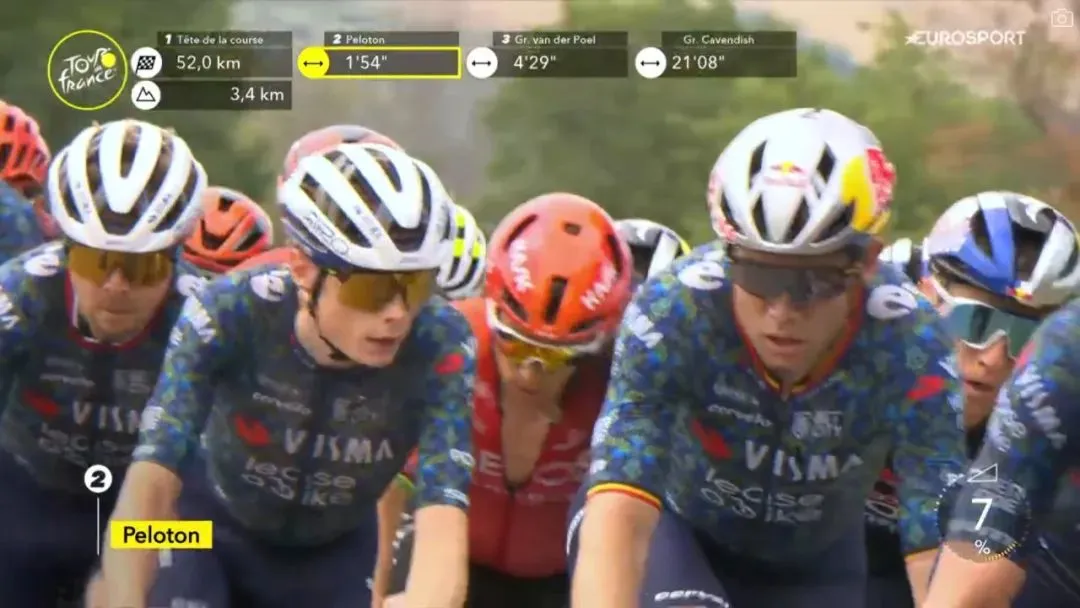
Wegner’s form seemed promising as the gap to the breakaway ahead narrowed to just 1 minute and 16 seconds. Bardet launched the first significant attack from the peloton, having earlier signaled his intentions by attempting to join the initial breakaway. The Frenchman, appearing energetic and fresh, effortlessly powered past the remnants of the original escapees, shedding Mohorič and Gibbons, and set his sights on catching his teammate Vande Broeck, who waited up ahead.
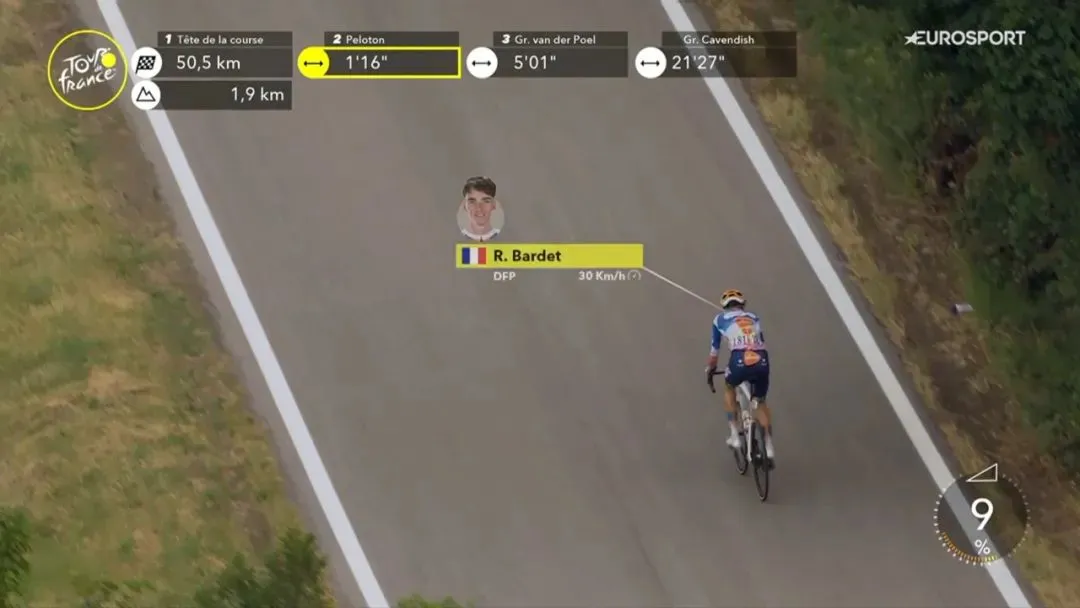
Bardet’s pivotal move saw him snatch the KOM points at the summit of the Saint-Léon climb from the sole survivor Abrahamsson, who had fought hard to stay away. The duo then regrouped with the DSM-Firmenich PostNL team at the bottom of a harrowing 75 km/h descent. They held a slim margin of 1 minute and 20 seconds over the chasing group which, in turn, began to fracture under the strain.
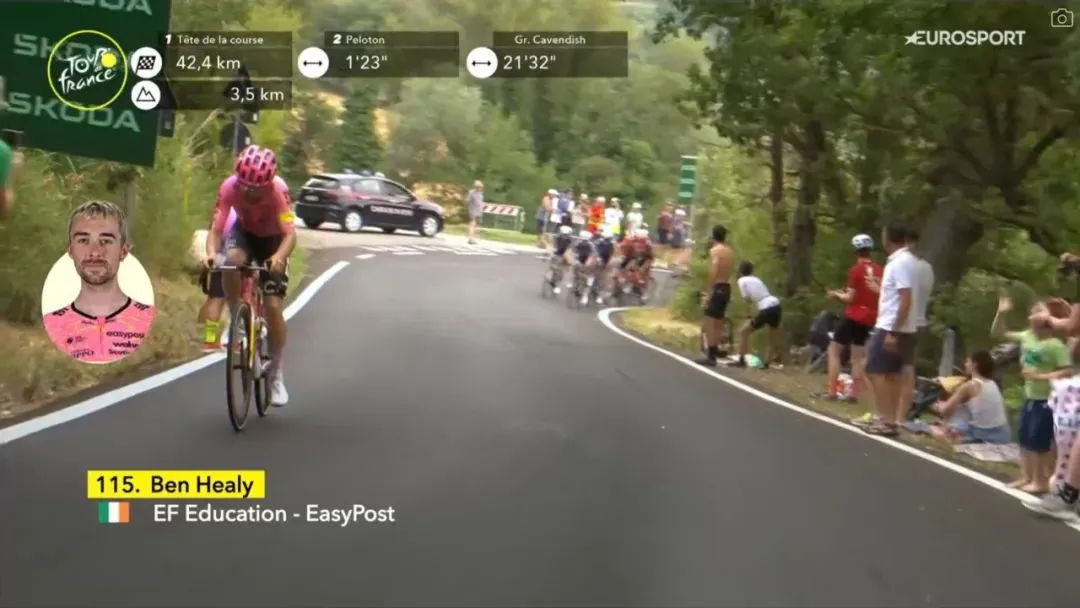
Ben Healy, the Irish national champion riding for EF Education-EasyPost, launched his own offensive on the downhill of the day’s penultimate climb, the Category 3 Col de Nieuw Majao. Kept within a minute’s deficit by Bardet, he briefly benefited from Madouas’ assistance before being distanced by the Frenchman. Meanwhile, Abrahamsson, having accomplished his mission and secured the first polka-dot jersey of the Tour de France, gradually fell back.
The chase group, led by Team Jumbo-Visma, seemed to ease off the pace, with Ayuso (UAE Team Emirates) dropping to the rear of the peloton, visibly struggling. With Madouas absorbed, only three riders remained upfront, facing the final 2 kilometers of the brutal opening stage’s uphill grind.
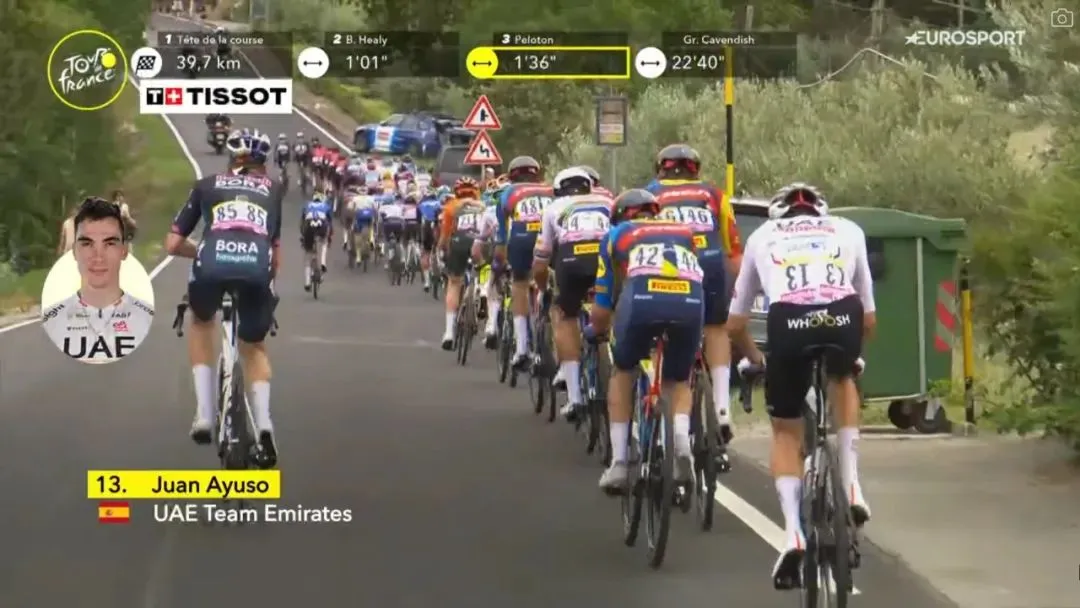
Ayuso’s form proved as unpredictable as ever.
Bardet and Vande Broeck worked seamlessly together to conquer the day’s final climb, the Category 3 Montée de Saint-Marin, a 7.1-kilometer ascent, and pushed towards the finish. With just 25 kilometers of downhill and flat roads remaining, the yellow jersey was within their grasp. Elsewhere in the race, two more Tiesj Benoot riders found themselves isolated as Jakobsen was dropped by Van der Poel’s sprint group, leaving only Welten to accompany him.
Bardet and his teammate looked strong on the descent, while EF Education-EasyPost was desperately trying to close the gap. Healy, exhausted from his earlier efforts, saw his team shift focus to their initial sprinter target Bettiol, as kilometers ticked down rapidly. Bardet and Vande Broeck maintained a lead of around 1 minute and 30 seconds.
The drama unfolding at the front contrasted with the struggles of some big names and teams spread throughout the course, each fighting their own battles against the challenging terrain and the searing heat.
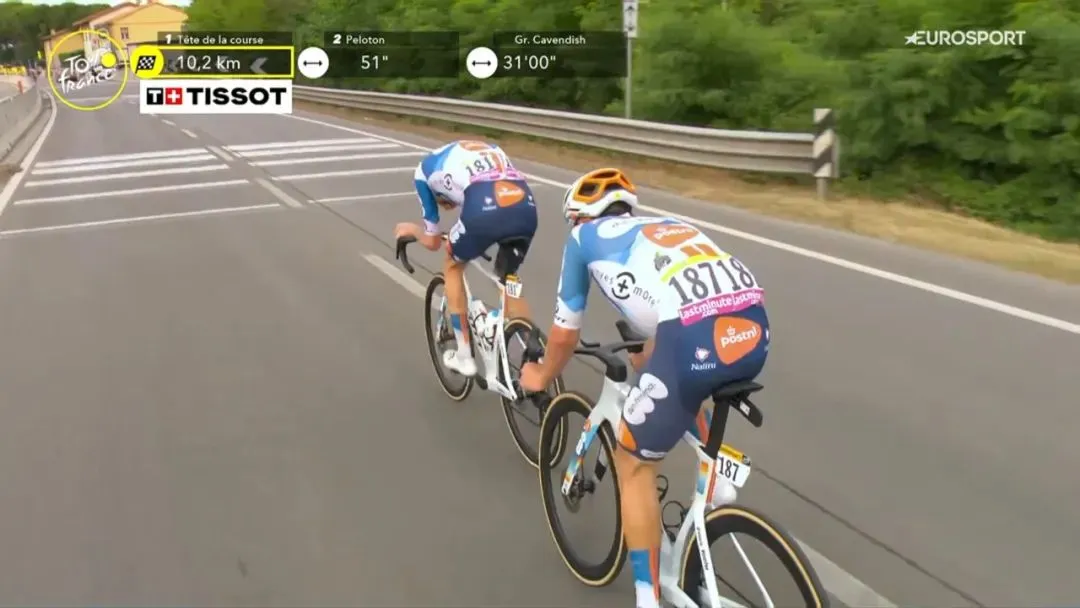
As the kilometers ticked by, the Tiesj Benoot duo’s advantage rapidly diminished. Vande Broeck, deservedly, would earn the day’s Most Combative Rider award, but in a matter of minutes, it seemed they would have little else to show for their incredible efforts.
The peloton, fueled by teams with general classification aspirations and sprint trains eager to set up a reduced bunch sprint, bore down on the leaders with relentless speed. The once substantial gap evaporated under the collective power of the chasing pack, turning the race into a tactical chess game in its final moments.
Bardet and Vande Broeck dug deep, pouring every ounce of energy into holding off the charging peloton. Their faces etched with determination, they knew the race was hanging by a thread, the prospect of victory growing slimmer with every passing second.
Yet, in cycling, as in life, it’s not always about winning—it’s about the fight, the courage to attack, and the will to push beyond limits. For Bardet and Vande Broeck, their bold breakaway would go down in history as a testament to their grit and panache, even if the ultimate prize eluded their grasp on this scorching hot day at the Tour de France.
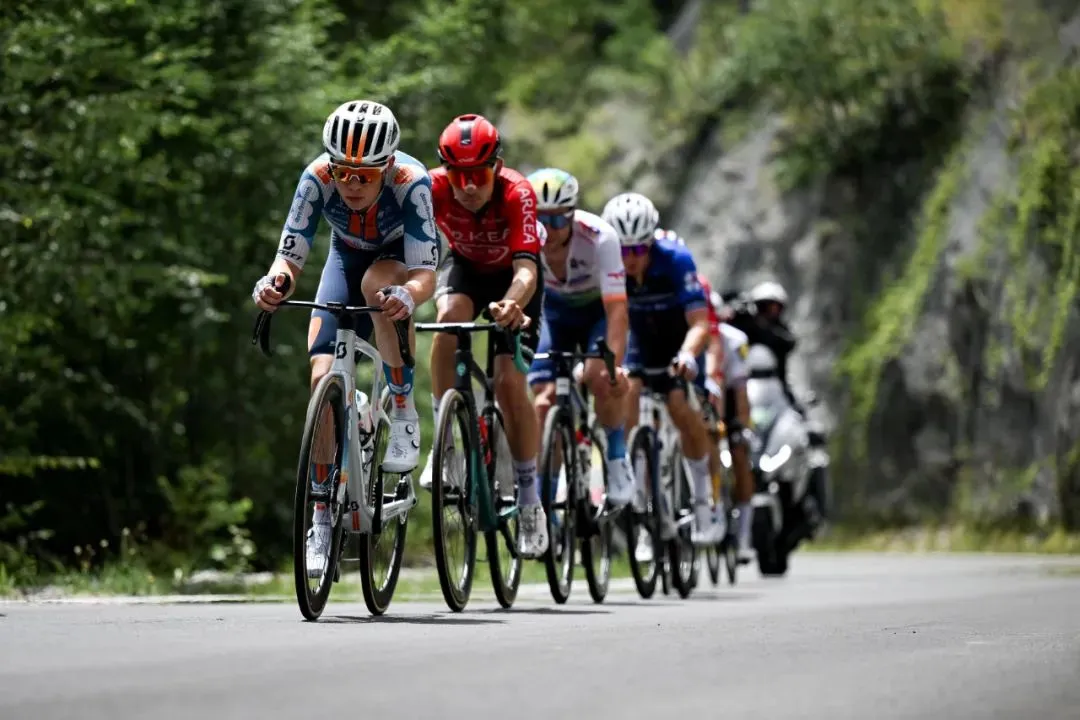
Vande Broeck’s claim to the day’s Most Combative Rider award was undisputed.
As the pair dug deep into their reserves, their faces contorted with exertion as they approached the finish line, it became evident that the sprint trains had miscalculated. Instead of being swallowed up by the charging peloton, Bardet and Vande Broeck crossed the line with enough of a gap to celebrate—sitting up in a moment of triumph that saw Bardet secure his first Tour de France stage win since 2017 and slip into the yellow jersey for the first time in his career.
The Frenchman’s emotional victory, against all odds, marked a triumphant return to the forefront of the sport’s biggest race. Cheers erupted from the crowd as Bardet’s determination and Vande Broeck’s tenacity paid off in the most prestigious of ways, defying the expectations of many and proving that in cycling, sometimes, the boldest moves yield the sweetest rewards.
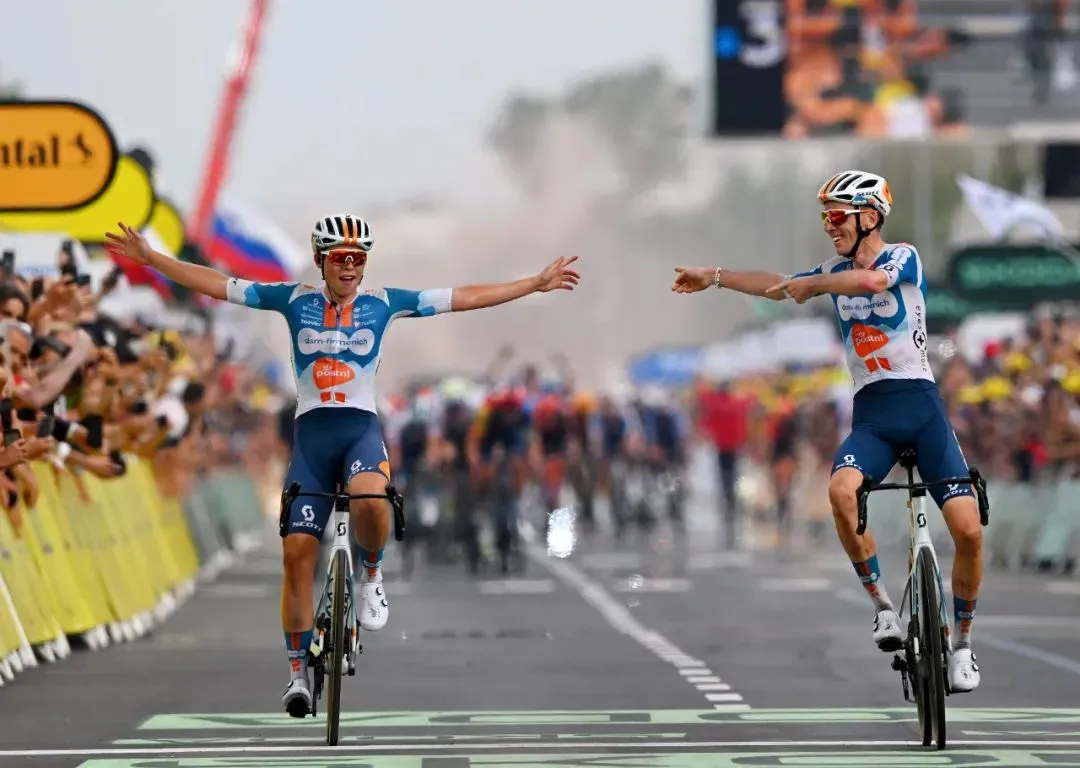
Cavendish, along with his teammates and Jakobsen, managed to finish within the time limit, but whether the grueling stage has jeopardized his quest for a 35th career Tour de France stage win remains to be seen. The toll of such an intense day in the saddle could have long-lasting effects on the sprinters’ aspirations, with their recovery and ability to contest upcoming flat stages now under question. The race is far from over, yet the mountainous opener has already dealt its fair share of challenges and reshuffled the cards for many riders and their ambitions.
Honor shirt
- General Classification 🟡 Yellow Jersey: Romain Bardet, Team DSM - Dutch Postal Service
- Points Classification 🟢 Green Jersey: Fabio Jakobsen, Team DSM - Dutch Postal Service
- Mountains Classification 🏔 Polka Dot Jersey: Jonas Vingegaard, Team UNO-X
- Best Young Rider ⚪ White Jersey: Fabio Jakobsen, Team DSM - Dutch Postal Service
Stage results
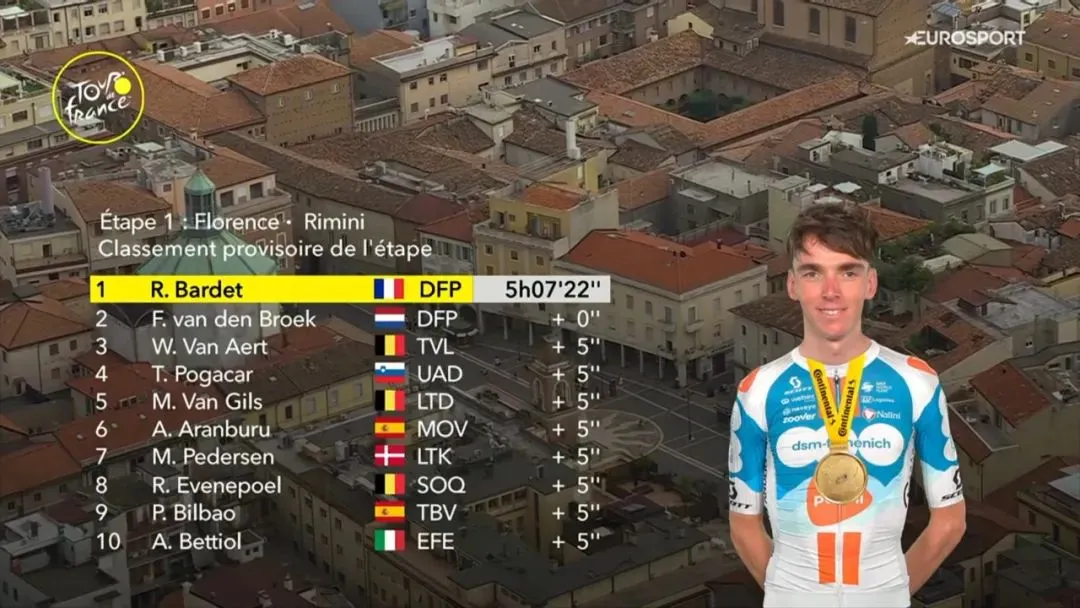
Total score
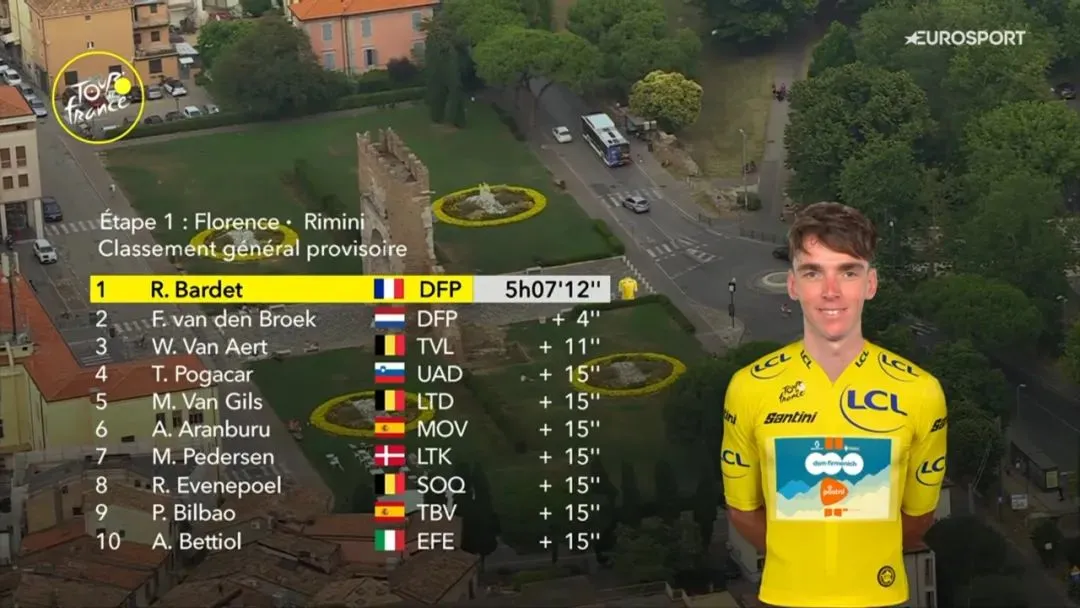
**Wonderful Atlas **
